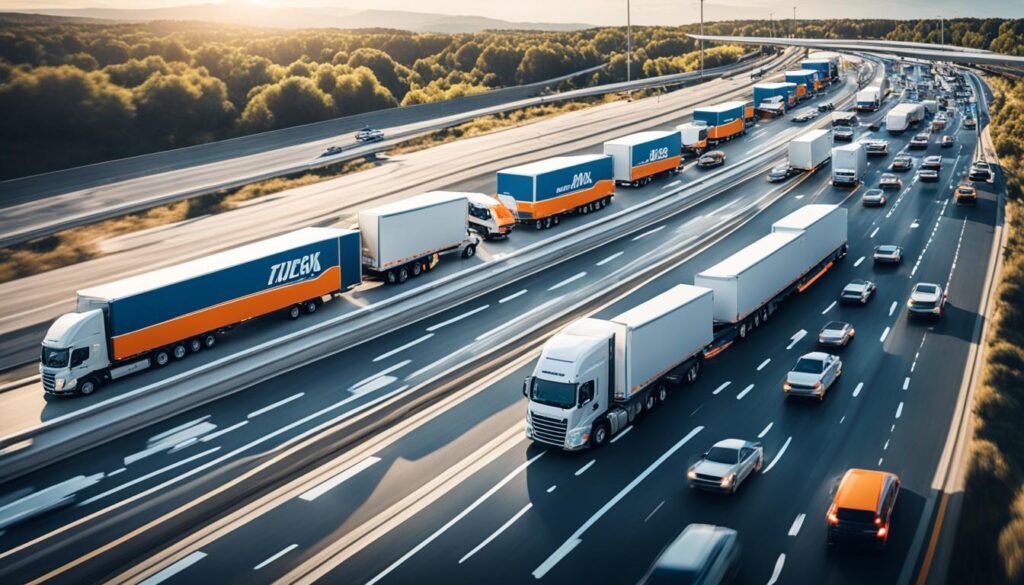The logistics industry is constantly evolving, and one of the key drivers of this transformation is big data. By harnessing the power of data analytics and technology, companies can improve their logistics processes, optimize supply chain operations, and enhance overall efficiency in transportation.
Transportation data analysis helps companies gain valuable insights into their operations. With robust data-driven transportation solutions, companies can make informed decisions to improve route planning, reduce costs, and streamline logistics processes. Supply chain optimization becomes more attainable as data analysis reveals areas for improvement and opportunities for increased efficiency.
Logistics technology plays a crucial role in leveraging big data in transportation. From connected vehicles and IoT sensors to advanced analytics and machine learning algorithms, the possibilities are endless. These technologies enable real-time data collection, analysis, and optimization for enhanced transportation efficiency.
Key Takeaways:
- Big data in transportation improves logistics and efficiency through data analysis and technology.
- Data-driven transportation solutions enable informed decision-making and optimization of routes.
- Supply chain optimization is achievable by leveraging insights from transportation data analysis.
- Logistics technology, such as connected vehicles and IoT sensors, plays a vital role in utilizing big data.
- Enhanced logistics efficiency leads to cost reduction and improved customer satisfaction.
The Benefits of Big Data in Logistics
Big data applications in logistics have revolutionized the transportation industry, offering a plethora of benefits for companies. By leveraging the power of data analytics, businesses can optimize routes, enhance supply chain visibility, and provide exceptional customer service. The use of big data enables better decision-making and strategic planning, thanks to real-time insights into transportation operations.
One of the key advantages of big data in logistics is improved transportation data management. With efficient data management systems in place, companies can track and monitor shipments with precision, leading to enhanced operational efficiency and cost reduction. Real-time data analytics also facilitate proactive problem-solving, enabling businesses to address transportation issues promptly and efficiently.
Furthermore, big data enables companies to gain valuable insights into their supply chain, enhancing transparency and visibility. By analyzing transportation data, companies can identify strengths and weaknesses in their logistics processes, pinpoint areas for improvement, and implement effective measures to optimize their supply chain operations.
In addition, big data in logistics allows for the optimization of routes, resulting in reduced fuel consumption, lower transportation costs, and improved delivery schedules. By analyzing historical data, weather patterns, traffic conditions, and other variables, companies can determine the most efficient and cost-effective routes for their operations.
Through the effective use of big data, companies can also enhance their customer service efforts. By analyzing customer preferences, purchasing patterns, and other relevant data, businesses can tailor their logistics strategies to meet customer demands more effectively. This leads to greater customer satisfaction and increased brand loyalty.
“Big data in logistics not only optimizes supply chain operations but also facilitates innovation and drives competitive advantage in the transportation industry.”
Enhancing Transportation Logistics with Data Analytics
Real-time data analytics plays a crucial role in enhancing transportation logistics. By harnessing the power of data, businesses can gain a comprehensive understanding of their transportation operations, enabling them to make informed decisions and strategic improvements. Data analytics provides invaluable insights into key performance indicators, such as delivery times, transportation costs, and customer satisfaction metrics.
The power of data analytics can be further magnified by incorporating machine learning algorithms and artificial intelligence. These technologies can analyze vast amounts of transportation data, identify patterns, detect anomalies, and generate accurate predictions. By leveraging these advanced capabilities, companies can proactively address potential issues, optimize routes, and ensure the smooth flow of goods throughout the supply chain.
Transportation Data Management: Tracking and Monitoring for Success
Effective transportation data management is vital for the success of logistics operations. By implementing robust data management systems, businesses can track and monitor shipments in real-time, ensuring accurate and timely deliveries. This level of visibility not only improves operational efficiency but also enhances customer satisfaction by providing accurate delivery updates.
Transportation data management also enables companies to conduct detailed performance analysis, identifying areas for improvement and implementing corrective actions. By utilizing comprehensive data analytics tools, businesses can track key performance metrics, identify bottlenecks, and optimize processes to drive efficiency and cost reduction.

| Benefits of Big Data in Logistics | Examples |
|---|---|
| Optimized routes | Reduced delivery times and fuel consumption |
| Enhanced supply chain visibility | Improved tracking and monitoring of shipments |
| Better decision-making | Real-time insights into transportation operations |
| Improved customer service | Customized logistics strategies based on customer preferences |
| Cost reduction | Efficient resource allocation and proactive problem-solving |
Key Use Cases of Big Data in Transportation
Big data is revolutionizing the transportation industry by enabling various use cases that enhance efficiency, optimize operations, and reduce costs. Here are some key use cases where big data is making a significant impact:
Transportation of Goods with Special Storage Conditions
Big data enables precise monitoring and control of storage conditions for goods that require special handling. Through real-time data analysis, companies can ensure that temperature-sensitive products, such as pharmaceuticals or food items, are transported under optimal conditions, minimizing the risk of spoilage or damage.
Demand Forecasting for Inventory and Production Optimization
By leveraging historical data, market trends, and predictive analytics, big data facilitates accurate demand forecasting. This enables businesses to optimize inventory levels, production planning, and procurement, minimizing excess inventory and stockouts while improving overall efficiency.
Route Optimization to Reduce Delivery Times and Fuel Consumption
With big data analytics, transportation companies can optimize their routes based on real-time data, traffic conditions, and historical patterns. This not only reduces delivery times and improves customer service but also maximizes fuel efficiency, resulting in cost savings and reduced carbon emissions.
Logistics Costs Reduction through Effective Resource Allocation
Big data analysis helps identify inefficiencies in logistics operations, allowing companies to optimize resource allocation. By analyzing data on inventory levels, transportation capacity, and demand patterns, businesses can minimize costs associated with warehousing, transportation, and inventory holding without compromising service levels.
Warehouse Management to Optimize Storage and Picking Processes
Big data plays a crucial role in warehouse management by optimizing storage layouts and streamlining picking processes. Through real-time monitoring and analysis of data on inventory levels, customer orders, and historical patterns, businesses can improve order fulfillment rates, reduce errors, and enhance overall warehouse efficiency.
Supply Chains Visibility for Tracking and Monitoring Shipments
Big data enables end-to-end visibility in supply chains, allowing businesses to track and monitor shipments in real-time. With the integration of sensors, IoT devices, and data analytics, companies can improve inventory accuracy, enhance supply chain visibility, and proactively address any issues or delays.
Drivers’ Safety through Monitoring and Assessing Behavior
Big data analytics can help enhance drivers’ safety by monitoring and assessing their behavior on the road. By analyzing data on speed, driver fatigue, and compliance with safety regulations, transportation companies can implement preventive measures and training programs to improve driver safety and reduce accidents.
Tailored Approach to Meet Specific Customer Needs
Big data allows businesses to adopt a tailored approach to transportation, catering to specific customer requirements. By analyzing customer preferences, historical data, and market trends, companies can offer personalized transportation services, optimizing routes, delivery schedules, and service levels to meet individual customer demands.
Freight Matching to Optimize Load Distribution
Big data platforms and algorithms facilitate efficient freight matching by connecting shippers with available carriers or trucking services. By matching demand and capacity, companies can optimize load distribution, minimize empty miles, and reduce transportation costs.
Delivery Optimization to Improve On-Time Delivery Rates and Customer Satisfaction
With big data analytics, businesses can optimize the last-mile delivery process, improving on-time delivery rates and enhancing customer satisfaction. By analyzing data on traffic, customer locations, and delivery patterns, companies can optimize delivery routes, allocate resources effectively, and provide accurate delivery estimates.
These key use cases demonstrate the diverse applications and benefits of big data in the transportation industry. By harnessing the power of data analytics, companies can unlock new opportunities, achieve operational excellence, and deliver superior customer experiences.

| Use Case | Benefits |
|---|---|
| Transportation of Goods with Special Storage Conditions | Minimizes spoilage and damage, ensuring product integrity |
| Demand Forecasting for Inventory and Production Optimization | Reduces excess inventory and stockouts, improves production planning |
| Route Optimization to Reduce Delivery Times and Fuel Consumption | Improves delivery times, maximizes fuel efficiency |
| Logistics Costs Reduction through Effective Resource Allocation | Minimizes costs associated with warehousing, transportation, and inventory holding |
| Warehouse Management to Optimize Storage and Picking Processes | Improves order fulfillment rates, reduces errors, enhances warehouse efficiency |
| Supply Chains Visibility for Tracking and Monitoring Shipments | Enhances inventory accuracy, improves supply chain visibility |
| Drivers’ Safety through Monitoring and Assessing Behavior | Improves driver safety, reduces accidents |
| Tailored Approach to Meet Specific Customer Needs | Offers personalized transportation services, meets individual customer demands |
| Freight Matching to Optimize Load Distribution | Reduces empty miles, minimizes transportation costs |
| Delivery Optimization to Improve On-Time Delivery Rates and Customer Satisfaction | Enhances on-time delivery rates, improves customer satisfaction |
Real-Life Examples of Big Data in Transportation
Several real-life examples demonstrate the successful implementation of big data in transportation. Companies across different sectors have leveraged data-driven solutions to optimize their operations, improve efficiency, and enhance customer satisfaction. Here are some notable examples:
Coreteka’s Big Data Tech Solution for Demand Forecasting
Coreteka, a leading technology company, developed a powerful Big Data tech solution that enables accurate demand forecasting in the transportation industry. By analyzing vast amounts of data, Coreteka’s solution provides companies with valuable insights to predict consumer demand more effectively. This allows businesses to optimize their supply chain, streamline their operations, and meet customer needs with precision.
SkyCell’s Containers for Medical Transportation
SkyCell revolutionized the transportation of medical supplies by creating innovative containers equipped with advanced IoT sensors. These containers collect and analyze data about temperature, humidity, and vibration levels, ensuring the safe transportation of temperature-sensitive pharmaceuticals and biologics. SkyCell’s solution offers real-time monitoring and control, minimizing the risk of damage and ensuring the integrity of critical medical shipments.
Domino’s Pizza Demand Forecasting for Cooking and Delivery Optimization
Domino’s Pizza, one of the world’s largest pizza delivery companies, relies on big data to forecast demand and optimize their cooking and delivery processes. By analyzing customer data, order history, and external factors like weather and events, Domino’s accurately predicts demand and adjusts its operations accordingly. This results in improved cooking efficiency, reduced delivery time, and enhanced customer satisfaction.
UPS’ ORION Algorithm for Route Optimization
United Parcel Service (UPS) implemented the ORION (On-Road Integrated Optimization and Navigation) algorithm to optimize its delivery routes. Through the analysis of various data sources, including historical traffic patterns, package volume, and customer preferences, ORION dynamically calculates the most efficient routes for UPS drivers. This intelligent routing system has significantly reduced mileage and fuel consumption, leading to cost savings and environmental benefits.
DHL’s Smart Truck Solution for Fuel Efficiency and CO2 Reduction
DHL, a global logistics leader, developed the Smart Truck solution, which integrates IoT sensors and big data analytics to improve fuel efficiency and reduce carbon dioxide (CO2) emissions. By collecting real-time data on factors like speed, acceleration, and fuel consumption, DHL gains valuable insights into driver behavior and vehicle performance. This data-driven approach allows DHL to optimize fuel usage, decrease CO2 footprint, and promote sustainable transportation practices.
Amazon’s Predictive Analytics in Distribution Centers
Amazon, the world’s largest online retailer, utilizes predictive analytics in its distribution centers to optimize order fulfillment and inventory management. By analyzing vast amounts of data, including historical sales patterns, customer preferences, and market trends, Amazon accurately forecasts demand and adjusts its inventory levels accordingly. This data-driven approach ensures efficient order processing, reduces storage costs, and enables faster delivery to customers.

These real-life examples highlight the transformative impact of big data in the transportation industry. By harnessing the power of data analytics, companies can gain valuable insights, make informed decisions, and unlock new opportunities for operational excellence and customer satisfaction.
The Future of Big Data in Transportation
As technology continues to advance, the future of big data in transportation looks promising. The integration of machine learning, artificial intelligence, and the Internet of Things (IoT) will revolutionize transportation operations, unlocking new levels of efficiency and optimization.
Machine learning algorithms will enable better route optimization by analyzing large volumes of transportation data, including traffic patterns, weather conditions, and historical performance. This will result in more accurate and efficient route planning, reducing delivery times and fuel consumption.
Artificial intelligence (AI) will play a crucial role in improving visibility and transparency in transportation. Through real-time data analysis, AI-powered systems can provide insights into shipment tracking, inventory management, and supply chain performance. This enhanced visibility will enable companies to identify bottlenecks, streamline processes, and make data-driven decisions for improved operational efficiency.

The Internet of Things (IoT) will further enhance transportation operations by connecting devices, vehicles, and infrastructure. This interconnectedness will enable real-time data collection and analysis, leading to proactive maintenance, optimized fleet management, and enhanced safety measures.
By leveraging machine learning, artificial intelligence, and the Internet of Things, the future of big data in transportation holds immense potential for cost reduction and enhanced operational efficiency. Companies will be able to optimize resource allocation, improve fuel efficiency, and minimize waste, resulting in significant cost savings. Additionally, the seamless integration of these technologies will lead to enhanced customer satisfaction through improved delivery times, accurate tracking, and personalized service offerings.
Conclusion
In conclusion, big data has the potential to revolutionize the transportation industry by enhancing logistics efficiency and optimizing supply chain operations. By utilizing data analytics, companies can make informed decisions, streamline routes, reduce costs, and provide better customer service.
The future of big data in transportation looks promising, with advancements in machine learning, artificial intelligence, and the Internet of Things. These technologies will drive further improvements in logistics efficiency and supply chain optimization. With better route optimization, improved visibility, and increased operational efficiency, companies can achieve cost savings, reduced fuel consumption, and enhanced customer satisfaction.
As the industry continues to embrace big data in transportation, it will become increasingly important for companies to invest in data-driven solutions and technologies. By harnessing the power of big data, companies can stay ahead of the competition and deliver efficient and cost-effective transportation services. With an ever-growing amount of data available, it is crucial for companies to leverage this resource to optimize their logistics processes and drive success in the evolving transportation landscape.
FAQ
How does big data improve logistics and efficiency in transportation?
Big data analysis provides insights that help optimize routes, enhance supply chain visibility, and improve decision-making in transportation operations. It leads to better logistics processes, cost reduction, and improved customer service.
What are the benefits of using big data in logistics?
Big data applications in logistics enable transportation data management, enhancing processes, optimizing supply chain operations, and improving overall efficiency. It allows for better tracking and monitoring of shipments, resulting in improved supply chain visibility and cost reduction.
What are the key use cases of big data in transportation?
Big data is used in various transportation scenarios, including the transportation of goods with special storage conditions, demand forecasting, routes optimization, logistics costs reduction, warehouse management, supply chains visibility, drivers’ safety, tailored approaches to customer needs, freight matching, and delivery optimization.
Can you provide real-life examples of big data being utilized in transportation?
Certainly! Coreteka developed a Big Data tech solution for demand forecasting, while SkyCell designed containers for medical transportation that collect data about temperature, humidity, and vibration levels. Domino’s Pizza uses big data for demand forecasting and optimization of cooking and delivery processes. UPS implemented the ORION algorithm for route optimization, and DHL developed the Smart Truck solution with IoT sensors for real-time data analysis to improve fuel efficiency. Amazon applies predictive analytics in its distribution centers for order fulfillment and inventory management optimization.
What does the future hold for big data in transportation?
The future of big data in transportation looks bright with the integration of machine learning, artificial intelligence, and the Internet of Things. These technologies will further enhance logistics efficiency by improving route optimization, visibility and transparency, and operational efficiency. This integration will result in cost savings, reduced fuel consumption, and increased customer satisfaction.
What is the impact of big data on logistics efficiency and supply chain optimization?
Big data has the potential to revolutionize the transportation industry by improving logistics efficiency and optimizing supply chain operations. It enables companies to make data-driven decisions, optimize routes, reduce costs, and enhance customer service, leading to improved overall efficiency in logistics and supply chain management.








